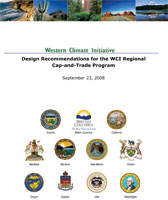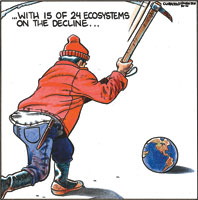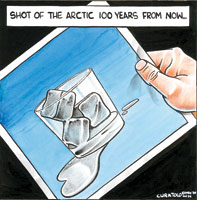
Manitoba Initiatives
Western Climate Initiative The Western Climate Initiative (WCI) was launched February 2007 by Governors of Arizona, California, New Mexico, Oregon and Washington to develop regional strategies to address climate change. In spring 2007, the Governor of Utah and Premiers of British Columbia and Manitoba joined the Initiative. Montana joined in January 2008 and Quebec moved from Observer to Partner status in April, 2008. Most recently, Ontario joined the WCI in July 2008, also moving from Observer to Partner status. The Western Climate Initiative (WCI) was launched February 2007 by Governors of Arizona, California, New Mexico, Oregon and Washington to develop regional strategies to address climate change. In spring 2007, the Governor of Utah and Premiers of British Columbia and Manitoba joined the Initiative. Montana joined in January 2008 and Quebec moved from Observer to Partner status in April, 2008. Most recently, Ontario joined the WCI in July 2008, also moving from Observer to Partner status.Manitoba Wildlands has joined a group of non-profit, civil society organizations across the western United States and Canadian provinces concerned about WCI outcomes. The organizations in the Western Climate Advocates Network (WeCAN) are providing input and recommendations to state and provincial signatories to the Western Climate Initiative (WCI) as they develop a greenhouse gas (GHG) emissions reductions program and design a cap and trade system. Visit Western Climate Initiative websiteView more information about WeCAN and civil society contributions to the WCI On September 23, 2008 the Western Climate Initiative (WCI) announced its final recommendations for the design of a regional market-based cap-and-trade program. The cap-and-trade design is an important aspect of the regional effort by seven US states and four Canadian provinces to meet their goal of reducing greenhouse gas (GHG) emissions by 15 percent below 2005 levels by 2020. WCI Partners represent over 70 percent of the Canadian economy and 20 percent of the U.S. economy. Manitoba has indicated that it will meet its emissions targets based on Kyoto Protocol objectives and WCI goals through emissions reductions inside Manitoba. The WCI recommendations include the following design elements:

The timeline agreed to by WCI Partners means that each would begin reporting emissions in 2011 for emissions that occur in 2010. The first phase of the cap-and-trade program will begin on January 1, 2012, with a three-year compliance period. The second phase will begin in 2015, when the program is expanded to include transportation fuels and residential, commercial and industrial fuels not otherwise covered in the first phase. Ontario and Quebec in Canada signed an MOU in summer 2008 to initiate a cap and trade program that will be on line sooner than the WCI plan. Design of WCI system will be finalized November 2008 with all Partner jurisdictions expected to pass supporting legislation in 2009 to implement the system.  Download September 23, 2008 WCI press release (PDF) Download September 23, 2008 WCI press release (PDF) Download September 23, 2008 WCI report, Design Recommendations for the WCI Regional Cap-and-Trade Program (PDF) Download September 23, 2008 WCI report, Design Recommendations for the WCI Regional Cap-and-Trade Program (PDF) Download WCI's Q & A document (PDF) Download WCI's Q & A document (PDF) Download WCI document, Overview: The Western Climate Initiative's Cap-and-Trade Program Design Recommendations (PDF) Download WCI document, Overview: The Western Climate Initiative's Cap-and-Trade Program Design Recommendations (PDF) Download WCI's regional map (PDF) Download WCI's regional map (PDF)View September 23, 2008 Government of British Columbia press release Sources: Western Climate Initiative, Government of British Columbia
Non-government organizations say the Western Climate Initiative recommendations for design of its cap-and-trade program for GHG emissions are "a step forward" but the program could have gone further towards addressing climate scientists' recommendations for an urgent response to the risks and threats posed by climate change.
Matt Horne, Acting Director of the Pembina Institute's B.C. Energy Solutions program commented, "The WCI recommendations represent a step forward from the draft version, but their lack of urgency reinforces the need for immediate action from Canada's federal and provincial governments. The system's start date of 2012, with full implementation not until 2015, is completely out of line with the recommendations of climate scientists." Gauging the potential or pitfalls of the WCI cap-and-trade program is difficult as states and provinces have choices to make regarding implementation within their individual jurisdictions. The Pembina Institute pointed to options for individual WCI Partners to strengthen the program. "In addition to the need for near-term action, several design issues will need to be strengthened prior to the WCI cap and trade program's launch in 2012. In particular, it will be critical for the states and provinces to commit to auctioning (as opposed to giving away free-of-charge) more than 10% of the pollution permits." As Christopher Bush, a UCS climate economist, noted, "Auctioning permits allows states to spend money on projects that can further reduce pollution and benefit their residents". The Pembina Institute did acknowledge the progress made on the issue of offsets, "On the positive side, there has been some important progress made by tightening the limits on offsets and reaffirming a commitment to including a sufficient percentage of emissions," said Horne. The Union of Concerned Scientists also commented on issues related to offsets, urging both states and provinces limit offsets and maximize pollution reduction in the region. Doing so, UCS experts say, would spur more clean technology development and protect public health by reducing conventional smog-forming and toxic air pollutants. UCS praised the fact that the WCI now "permits states and provinces to set even tighter limits on offsets" - an improvement over the draft recommendations issued in July 2008.  Download September 23, 2008 Pembina Institute press release (DOC) Download September 23, 2008 Pembina Institute press release (DOC)View September 23, 2008 Union of Concerned Scientists press release  According to Canadian Parks and Wilderness Society (CPAWS), recommendations released September 23, 2008 by the Western Climate Initiative (WCI) for its regional cap-and-trade program duck a key issue -- whether partners will be allowed to falsely claim carbon neutrality for logging and burning natural forests to produce electricity.
According to Canadian Parks and Wilderness Society (CPAWS), recommendations released September 23, 2008 by the Western Climate Initiative (WCI) for its regional cap-and-trade program duck a key issue -- whether partners will be allowed to falsely claim carbon neutrality for logging and burning natural forests to produce electricity.Burning wood results in significant carbon dioxide emissions. Yet proponents of producing bioenergy from wood say the fuel does not cause pollution or emissions because trees grow back and remove all the carbon back out of atmosphere as they grow. "The problem is that it can take more than a hundred years for a natural forest to take the carbon back from the atmosphere, if it ever does. In the meantime, switching to woody bionenergy would actually increase emissions in the short-term when emission reductions are most urgently needed," says Chris Henschel, an expert on forests and climate change with CPAWS. Environmental groups have been pushing for emissions from all energy sources to be counted within the WCI cap-and-trade program. The final September 23, 2008 recommendations allow each province and state to decide whether or not to ignore these real emissions and treat them as carbon neutral. CPAWS contends the WCI needs to send a clear signal it will not create a perverse incentive to log and burn natural forests with no climate benefit. Creating a market to burn wood from natural forests for electricity could result in much greater pressures to log forests and accelerate clear cutting in Northern pristine boreal forests. View September 24, 2008 Canadian Parks and Wilderness Society press releaseSource: Canadian Parks and Wilderness Society
 Download August 13, 2008 Submission to WCI Re: Western Climate Initiative Draft Design Recommendations for a cap-and-trade program by Climate Action Network Canada, David Suzuki Foundation, Manitoba Wildlands, Pembina Institute and WWF-Canada Download August 13, 2008 Submission to WCI Re: Western Climate Initiative Draft Design Recommendations for a cap-and-trade program by Climate Action Network Canada, David Suzuki Foundation, Manitoba Wildlands, Pembina Institute and WWF-Canada  (PDF) (PDF)
The Western Climate Initiative released its draft design framework for a broad cap-and-trade program to reduce greenhouse-gas emissions July 23, 2008.  Download July 23, 2008 Cover Memo to Draft Design Recommendations for WCI cap-and-trade program document (PDF) Download July 23, 2008 Cover Memo to Draft Design Recommendations for WCI cap-and-trade program document (PDF) Download July 23, 2008 Draft Design Recommendations for WCI cap-and-trade program (PDF) Download July 23, 2008 Draft Design Recommendations for WCI cap-and-trade program (PDF)
The cap would force polluting companies to pay for emissions they created. They would then be free to pass those costs on to consumers. The program would grant each participating province (British Columbia, Manitoba, Ontario and Quebec) an allocated and declining cap for each year from 2012 to 2020, set in advance. Those caps have not yet been set, but would be based on population, electricity consumption and production, and economic activity - not on current efficiency, the WCI report says. As such, the most efficient provinces in 2012 could sooner sell credits to other regions, creating a revenue stream. In Manitoba Premier Doer made a public commitment in March 2008 that all reductions in emissions for the province's Kyoto targets, and hence for WCI reporting, would be from actual reductions in emissions within the province. Emissions caused by production of transportation fuels, such as gasoline, are included in the draft design, though with significant delay before they are included. Others include electric generation, general combustion, industrial process emission sources and transportation fuel combustion. Emissions from production of biofuel would not be included. The gases considered as emissions are carbon dioxide, methane, nitrous oxide, hydrofluorocarbons, perfluorocarbons, and sulphur hexafluoride. The cap would apply to all companies emitting more than 25,000 tonnes of those gases, measured as "carbon dioxide equivalents" per year. This level is much lower than current reporting levels for Canada's GHG national inventory. View July 24, 2008 Globe and Mail articleView July 24, 2008 Vancouver Sun article Climate advocates have been supportive of the intent and overall direction of the WCI, but were cautiously critical of the draft cap-and-trade recommendations. They expressed disappointment at the prospect of initial caps being set at business-as-usual levels and the idea that the framework wouldn't bring large polluters into the system until 2012, and even 2015 for some (for more information, see section below, WCI's Draft Cap-and-Trade System Flawed: Canadian Climate Advocates). The plan was open for public review and comments until mid-August and is scheduled to be finalized September 2008. The WCI also released draft recommendations for member reporting of greenhouse gases on July 23, 2008.  Download July 23, 2008 Cover Memo to Draft Essential Requirements of Mandatory Reporting Requirements document (PDF) Download July 23, 2008 Cover Memo to Draft Essential Requirements of Mandatory Reporting Requirements document (PDF) Download July 23, 2008 Draft Essential Requirements of Mandatory Reporting (PDF) Download July 23, 2008 Draft Essential Requirements of Mandatory Reporting (PDF)Sources: WCI, Globe and Mail, Vancouver Sun
As representatives set off for San Diego to attend the latest Western Climate Initiative (WCI) meetings on July 29, 2008, Canadian conservation organizations reiterated their overall support for the Initiative, while identifying a number of weaknesses in the newly released draft design of WCI's greenhouse gas cap-and-trade program. |
|
A competitive polluter-pay principle is a good one, say WWF-Canada, the David Suzuki Foundation and the Pembina Institute, but emission caps are too high and the timeline - as late as 2012 or 2015 for some large emitters - too long. "It's too late. This is a pressing issue and we don't have time to lose," said Nicholas Heap, climate and energy policy analyst with the David Suzuki Foundation. |
 By Fred Curatolo Larger version |
It appears that the WCI proposal would set initial caps at business-as-usual levels, noted Pembina Institute's Cherise Burda. WWF Canada, the Pembina Institute and the David Suzuki Foundation say the WCI partners should:
The Western Climate Initiative (WCI) held its third full stakeholder meeting on July 29th in San Diego. The meeting follows meetings in Portland and Salt Lake City, and was convened to present and discuss WCI recommendations (see section above, WCI Releases Draft Cap and Trade Program Framework). View July 29, 2008 Toronto Star articleView July 28, 2008 WWF Canada press release  Download July 28, 2008 WWF Canada backgrounder, Ontario and the Western Climate Initiative (PDF) Download July 28, 2008 WWF Canada backgrounder, Ontario and the Western Climate Initiative (PDF) Download David Suzuki Foundation/Pembina Institute July 2008 document, Western Climate Initiative San Diego Meeting July 29, 2008 Download David Suzuki Foundation/Pembina Institute July 2008 document, Western Climate Initiative San Diego Meeting July 29, 2008Sources: Toronto Star, WWF Canada, David Suzuki Foundation, Pembina Institute
WeCAN - the Western Climate Advocates Network - is a group of non-profit, civil society organizations across the western United States and Canadian provinces. The organizations share common concerns about global warming and have come together to provide input and recommendations to signatories to the Western Climate Initiative (WCI) as they develop a greenhouse gas (GHG) emissions reductions program and design an emissions cap and trade system.
For more information and resources related to WeCAN, see section below, Manitoba Wildlands Joins Western Climate Advocates Network (WeCAN) Members of WeCAN are united in their support for a cap and trade system and complementary policies that will lead to deep reductions in greenhouse gas emissions in all member jurisdictions. The network made various submissions to the WCI in the lead up to the WCI's release of its draft cap-and-trade framework and draft reporting requirements.  Download August 13, 2008 WeCAN Final Submission to the WCI Re: Western Climate Initiative Draft Design Recommendations for a cap-and-trade program (PDF) Download August 13, 2008 WeCAN Final Submission to the WCI Re: Western Climate Initiative Draft Design Recommendations for a cap-and-trade program (PDF) Download August 13, 2008 WeCAN Submission to WCI Re: Economic Modeling exercise (PDF) Download August 13, 2008 WeCAN Submission to WCI Re: Economic Modeling exercise (PDF) Download August 13, 2008 WeCAN Submission to WCI Re: Transportation Sector Recommendations: Market and Complementary Policies (PDF) Download August 13, 2008 WeCAN Submission to WCI Re: Transportation Sector Recommendations: Market and Complementary Policies (PDF) Download July 22, 2008 WeCAN Submission to WCI - input to help guide incorporation of forest sector and land use/land use change strategies into overall program design (PDF) Download July 22, 2008 WeCAN Submission to WCI - input to help guide incorporation of forest sector and land use/land use change strategies into overall program design (PDF) Download July 18, 2008 WeCAN Submission to the WCI - final communication to Western Climate Initiative (WCI) partners prior to release of final draft recommendations (PDF) Download July 18, 2008 WeCAN Submission to the WCI - final communication to Western Climate Initiative (WCI) partners prior to release of final draft recommendations (PDF) Download June 6, 2008 WeCAN submission to WCI - Collective position on the May 16, 2008 consolidated Draft Design Recommendations for Offsets (PDF) Download June 6, 2008 WeCAN submission to WCI - Collective position on the May 16, 2008 consolidated Draft Design Recommendations for Offsets (PDF) Download June 6, 2008 WeCAN Submission to WCI - Collective position on May 16, 2008 consolidated Draft Design Recommendations for Reporting (PDF) Download June 6, 2008 WeCAN Submission to WCI - Collective position on May 16, 2008 consolidated Draft Design Recommendations for Reporting (PDF) Download June 6, 2008 WeCAN Submission to WCI - Collective position on May 16, 2008 consolidated Draft Design Recommendations on Scope (PDF) Download June 6, 2008 WeCAN Submission to WCI - Collective position on May 16, 2008 consolidated Draft Design Recommendations on Scope (PDF) Download June 6, 2008 WeCAN Submission to WCI - Collective position on the May 16, 2008 consolidated Draft Design Recommendations for Allocations (PDF) Download June 6, 2008 WeCAN Submission to WCI - Collective position on the May 16, 2008 consolidated Draft Design Recommendations for Allocations (PDF) Download June 6, 2008 WeCAN Submission to WCI - Collective position on May 16, 2008 consolidated Draft Design Recommendations for Electricity (PDF) Download June 6, 2008 WeCAN Submission to WCI - Collective position on May 16, 2008 consolidated Draft Design Recommendations for Electricity (PDF)Source: Western Climate Advocates Network (WeCAN)
Manitoba Wildlands is posting submissions to the WCI by climate advocates and civil society groups who support and wish to strengthen the Western Climate Initiative.
Union of Concerned Scientists (UCS) Labour Groups West First Pacific Forest Trust Center for Energy Efficiency and Renewable Technologies (CEERT) / Center for Resource Solutions (CRS) / Renewable Northwest Project (RNP)  On Friday, July 18, 2008, the ten Western Climate Initiative (WCI) Partners announced their intention to recognize Ontario as a member of the regional climate program. This action comes in response to a formal membership request sent by Premier Dalton McGuinty. Ontario has been participating as an observer in WCI since August 2007.
On Friday, July 18, 2008, the ten Western Climate Initiative (WCI) Partners announced their intention to recognize Ontario as a member of the regional climate program. This action comes in response to a formal membership request sent by Premier Dalton McGuinty. Ontario has been participating as an observer in WCI since August 2007.With Ontario as a member, the WCI now represents approximately 73% of Canada's economy and 20% of America's economy - making it the largest intended cap-and-trade program in North America. Ontario has committed to reducing its GHG emissions to 6% below 1990 levels by 2014 and 15% below 1990 levels by 2020. Ontario's refusal to embrace the California tailpipe plan had previously blocked it from joining. However, sources cited in the media indicate that WCI members wanted Ontario on board because inclusion of Canada's largest province would help build momentum for a cap-and-trade system. WCI project manager Patrick Cummins said other factors may also be considered in WCI membership, including an overall commitment to address climate change. The July 18, 2008 WCI press release announcing Ontario's membership does not make any reference to adoption of the California vehicle emissions standard.  Download July 17, 2008 Ontario government letter to WCI (PDF) Download July 17, 2008 Ontario government letter to WCI (PDF) Download July 18, 2008 WCI press release (PDF) Download July 18, 2008 WCI press release (PDF) Download August 4, 2008 Globe and Mail article (DOC) Download August 4, 2008 Globe and Mail article (DOC) The group of non-governmental organizations (NGO) has developed a set of principles to guide the development of the WCI climate emissions reductions program. The principles are as follows:
 Download October 19, 2007 letter to British Columbia's Government Climate Change Secretariat (PDF) Download October 19, 2007 letter to British Columbia's Government Climate Change Secretariat (PDF) Download October 31, 2007 letter to Manitoba Premier Gary Doer and Minister of Science, Technology, Energy and Mines, Jim Rondeau (PDF) Download October 31, 2007 letter to Manitoba Premier Gary Doer and Minister of Science, Technology, Energy and Mines, Jim Rondeau (PDF) Manitoba Wildlands is making available here presentation materials regarding the structure and committee work of the WCI. None of this information is available in Manitoba.  Download the November 2007 PEW Center Overview, Adaptation Planning - What U.S. States and Localitites are Doing (PDF) Download the November 2007 PEW Center Overview, Adaptation Planning - What U.S. States and Localitites are Doing (PDF) Download the WCI/PEW September 2007 presentation, Responding to Climate Change: an introduction to greenhouse gas cap-and-trade design (PDF) Download the WCI/PEW September 2007 presentation, Responding to Climate Change: an introduction to greenhouse gas cap-and-trade design (PDF) Download the WCI/Arizona State September 2007 Stakeholder presentation (PDF) Download the WCI/Arizona State September 2007 Stakeholder presentation (PDF) Download the WCI/New Mexico State September 2007 WCI Subcommittees presentation (PDF) Download the WCI/New Mexico State September 2007 WCI Subcommittees presentation (PDF)Recent stakeholder meetings in January and May 2008 included representatives from Climate Action Network Canada. Canadian climate advocates met with their peers in WECAN prior to meetings concerning WCI work plans, targets, thresholds for reporting emissions reductions, and energy efficiency. Manitoba Wildlands participates in WECAN and attended the May 2008 meetings.  Download August 2008 Manitoba Wildlands, Western Climate Initiative - Background Research, Resources Download August 2008 Manitoba Wildlands, Western Climate Initiative - Background Research, Resources  (PDF) Updated (PDF) Updated
The eight members of the Western Climate Initiative (WCI) have established a regional goal to reduce greenhouse gas (GHG) emissions to 15 percent below 2005 levels by 2020. |
|
| The regional goal reflects the combined impact of GHG emissions goals each WCI member has already set and does not replace members' individual goals, including when these goals exceed the WCI goal. The 15 percent emissions reduction from a 2005 base year means the combined target does not match established under the Kyoto Protocol for Canada of 6 percent below 1990 levels. |
 By Fred Curatolo Larger version |
The WCI regional goal includes a commitment for each partner to "update the other WCI partners on their climate action plan and GHG emissions inventories every two years" but no public reporting requirements are mentioned, although membership in the WCI requires participation in The Climate Registry. Manitoba's individual short-term (2010-2012) GHG emissions reduction target is stated as 6 percent below 1990 levels in the WCI announcement. Manitoba is the only WCI member that has not established a target for 2020 and instead uses the same target as for 2010-2012, noting it expects to "meet or do better than its short term goal". Manitoba's 2002 Climate Change Action Plan indicates that "[b]y 2010, Manitoba's net contribution could equal a greenhouse gas reduction of up to 18 per cent from 1990 levels." The Manitoba 2002 Climate Action Plan is no longer available on its government website. There is no public data regarding emissions in Manitoba, as of 1990, or since 2002. Download the August 22, 2007 WCI Statement of Regional Goal (PDF) Download the August 22, 2007 WCI Statement of Regional Goal (PDF)The August 22, 2007 announcement reflects the original WCI agreement to establish a Western regional GHG reduction goal by the end of August 2007 as part of WCI members' commitment to significantly reduce regional GHG emissions. View August 22, 2007 Government of Manitoba press release Visit Western Climate Initiative website View July 23, 2007 Manitoba Wildlands News item  Sources: Government of Manitoba, Western Climate Initiative
 The WRCI began February 2007 with the signing of an agreement by the Governors of Arizona, California, New Mexico, Oregon, and Washington to establish a regional greenhouse gas reduction goal and develop market-based strategies to achieve the goal. British Columbia joined in April 2007 and Utah in May. Wyoming and Colorado are participating as observers while they continue to develop their state policies and initiatives. The purpose of the WRCAI is to identify, evaluate and implement ways to collectively reduce greenhouse gas emissions and to achieve related co-benefits. All participants in the WRCAI are also members of The Climate Registry, a new cross-border greenhouse gas registry launched in May 2007 with 34 state, 2 provincial, and 3 tribal members. Some specific provisions of the Western Climate Initiative agreement:
 Download Western Regional Climate Action Initiative (PDF) Download Western Regional Climate Action Initiative (PDF)Visit The Climate Registry Source: Government of Manitoba |
|
 2002-2014
2002-2014


 The draft cap-and-trade framework proposes setting a hard cap on industrial emissions, providing cash incentives for companies to reduce their pollution levels. Greener companies can sell their pollution "credits" to the highest bidder - to those emitters who can't meet their targets. The intent is to encourage efficiency and conservation by rewarding industries that get below the cap and adding costs to high polluters.
The draft cap-and-trade framework proposes setting a hard cap on industrial emissions, providing cash incentives for companies to reduce their pollution levels. Greener companies can sell their pollution "credits" to the highest bidder - to those emitters who can't meet their targets. The intent is to encourage efficiency and conservation by rewarding industries that get below the cap and adding costs to high polluters.